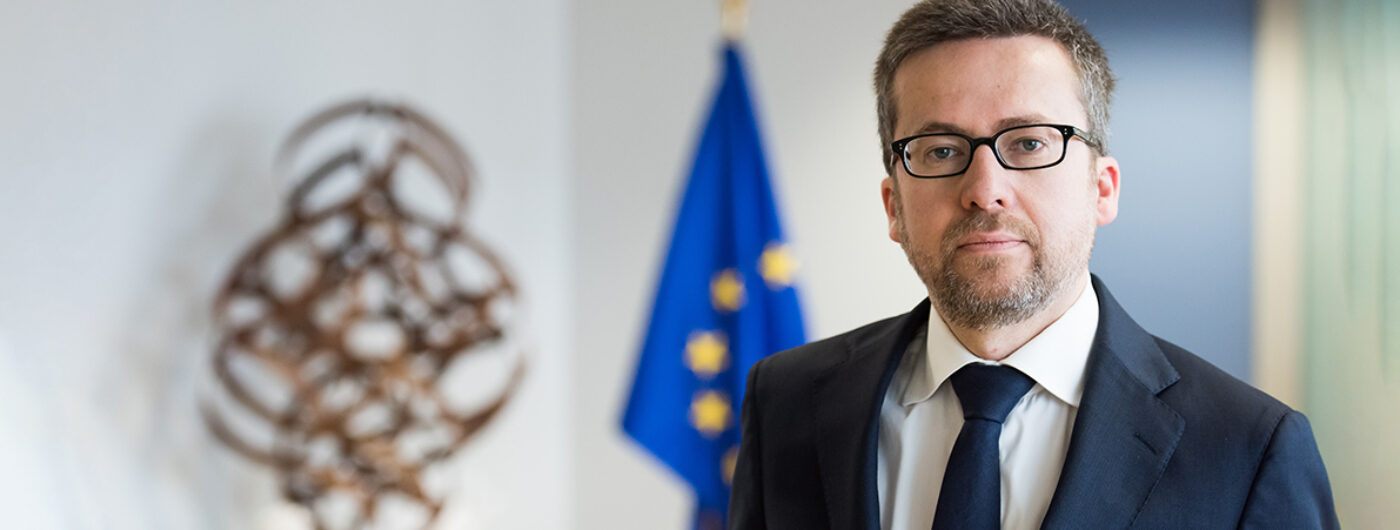
Interview with EU Comissioner Carlos Moedas: “Bridges built between nations through research and innovation can contribute to a culture of cooperation and peace”
The UfM interviews Carlos Moedas, Commissioner on Research, Science and Innovation (2014-2019)
Which impact can be expected from Horizon 2020 projects for Southern Mediterranean countries, and more broadly for regional R&I cooperation between both rims of the Mediterranean? What remains to be done to increase their impact?
Joint Euro-Mediterranean actions in science, technology and innovation under Horizon 2020 are addressing many of the pressing challenges in the region. PRIMA, the Partnership in Research and Innovation in the Mediterranean Area, was set up to improve sustainable water management and food production. BLUEMED, the Research and Innovation Initiative for Blue Jobs and Growth in the Mediterranean Area, works towards a healthy, safe and productive sea basin.
Such Horizon 2020 projects contribute to inclusive and sustainable growth and have the potential to improve the lives of millions. The trend is towards a growing sense of co-ownership and willingness to engage in joint priority setting between the rims of the Mediterranean. To build on this momentum, including under Horizon Europe, more work based on mutual interest and shared benefits needs to be done to fully unleash the potential of the region.
In your opinion, how could science diplomacy be further fostered across the Mediterranean in support of a deeper regional integration?
Science diplomacy has an important role to play in addressing shared challenges that transcend national borders and can only be solved through cooperation. Regional decision-making, for instance, can benefit from incorporating a strong cross-national and cross-sectoral base of scientific expertise and resources. Such bridges built between nations through research and innovation can also contribute to a culture of cooperation and peace.
Mobility and professional contacts between researchers, practitioners and students are another key dimension of science diplomacy. In this sense, more work is needed to step up the involvement of regional scientific diasporas, be it European researchers abroad or foreign researchers within Europe. My hope is that, over time, lessons learned and benefits from the co-decision making and co-management of Horizon 2020 projects will spill over to other political, economic and socio-cultural areas and result in improved overall regional cooperation.
Which role an institution such as the Union for the Mediterranean could play in this regard?
Support to Euro-Mediterranean research and innovation activities is part of the Union for the Mediterranean’s mandate to create an area of peace, stability and shared prosperity. Be it in political fora, platforms of dialogue or projects with regional impact, the Union for the Mediterranean has built political and stakeholder support for the setup of framework conditions needed for enhancing researcher cooperation and ensuring knowledge and technology transfers.
I was pleased to note the organisation of the first-ever joint EU-UfM Horizon 2020 Regional Info Day in Fes, Morocco, on 22 January. Such collaboration should continue, also in view of Horizon Europe, to benefit the setup of interdisciplinary and cross-sectoral Mediterranean consortia. I also count on the Union for the Mediterranean as a partner in promoting the use of pooled regional scientific expertise for addressing the Sustainable Development Goals of the 2030 Agenda.
____
Carlos Moedas
European Comissioner on Research, Science and Innovation (2014-2019)
Born in 1970, Carlos Moedas holds a degree in civil engineering from the Instituto Superior Técnico and an MBA from Harvard Business School. He has worked for Goldman Sachs and Eurohypo Investment Bank. Elected a Member of Parliament in 2011, he was appointed Secretary of State working directly under the Prime Minister. In this capacity, he was Portugal’s chief interlocutor with the Troika (Commission, European Central Bank and International Monetary Fund), and also supervised the implementation of the programme agreed with the international creditors.

